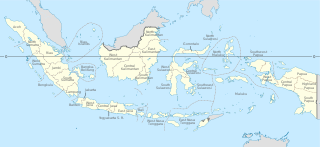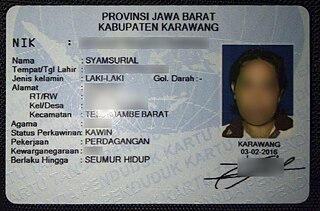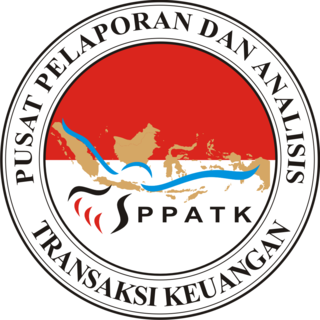Related Research Articles

Provinces of Indonesia are the 34 administrative division of Indonesia and the highest tier of the local government. Provinces are further divided into regencies and cities, which are in turn subdivided into districts (kecamatan).
A birth certificate is a vital record that documents the birth of a person. The term "birth certificate" can refer to either the original document certifying the circumstances of the birth or to a certified copy of or representation of the ensuing registration of that birth. Depending on the jurisdiction, a record of birth might or might not contain verification of the event by such as a midwife or doctor.
A regency is an administrative division of Indonesia, directly under a province. The Indonesian term kabupaten is also sometimes translated as "municipality". Regencies and cities are divided into districts.

Indonesia is divided into provinces. Provinces are made up of regencies (kabupaten) and cities (kota). Provinces, regencies and cities have their own local governments and parliamentary bodies.

A travel document is an identity document issued by a government or international entity pursuant to international agreements to enable individuals to clear border control measures. Travel documents usually assure other governments that the bearer may return to the issuing country, and are often issued in booklet form to allow other governments to place visas as well as entry and exit stamps into them. The most common travel document is a passport, which usually gives the bearer more privileges like visa-free access to certain countries. While passports issued by governments are the most common variety of travel document, many states and international organisations issue other varieties of travel documents that the holder to travel internationally to countries that recognise the documents. For example, stateless persons are not normally issued a national passport, but may be able to obtain a refugee travel document or the earlier "Nansen passport" which enables them to travel to countries which recognise the document, and sometimes to return to the issuing country.

An Indonesian passport is a travel document issued by the Government of Indonesia to Indonesian citizens residing in Indonesia or overseas. The main governing body with regards to the issuance of such passport(s), possession(s), withdrawal and related matters is the Directorate General of Immigration under the Ministry of Law and Human Rights. Indonesia is one among many countries in the world that does not recognize multiple citizenship for its citizens and such citizens will automatically lose her/his Indonesian citizenship if another citizenship is acquired voluntarily. Special exceptions allow newly born citizens to hold dual nationalities until his/her eighteenth birthday after which a choice of either nationalities should be decided. The latest Indonesian passport has different national birds and sceneries on each page.

Law of Indonesia is based on a civil law system, intermixed with local customary law and the Roman Dutch law. Before the Dutch presence and colonization began in the sixteenth century, indigenous kingdoms ruled the archipelago independently with their own custom laws, known as adat. Foreign influences from India, China and the Middle East have not only affected the culture, but also weighed in the customary adat laws. People of Aceh in Sumatra, for instances, observes their own sharia law, while Toraja ethnic group in Sulawesi are still following their animistic customary law.

Awards and decorations of the Republic of Indonesia are both military and civilian awards for service and personal contributions to the Republic of Indonesia. According to the Constitution of Indonesia, Chapter III Article 15: "The President grants titles, decorations and other honors as regulated by Law".

The Indonesian identity card, known in Indonesian as the Kartu Tanda Penduduk or KTP, is an identity card issued in Indonesia. Separate versions exist for Indonesian citizens and non-Indonesian residents. The card is issued upon reaching the age of 17 or upon marriage. For Indonesian citizens, the card is valid for life. For non-Indonesian citizens, the card's expiry date is the same as that of their residency permit. Since 2011, the Indonesian government has issued an electronic version of the card, known as the e-KTP, which contains an embedded microchip.
The Paspor Orang Asing is an alien's passport issued by Indonesia. It is a two-year, 24-page document issued to persons permanently resident in Indonesia who cannot obtain travel documents from any other country. It is referred to in English variously as "Indonesian Passport for Aliens", "Indonesian Stateless Person Passport", or "Indonesian Stateless Travel Document".
SPLP may refer to:
The term district, in the context of Indonesia, refers to the third-level administrative subdivision, below regency or city. The local term kecamatan is used in majority of Indonesian areas, except in Papua, West Papua, and the Special Region of Yogyakarta. The term distrik is used in Papua and West Papua. In Yogyakarta, the term kapanewon is used for districts within regency, while the term kemantren is used for districts within city. According to Statistics Indonesia, there are a total of 7,252 districts in Indonesia as at 2019, subdivided into 83,820 administrative villages.
Indonesian Small Islands Directory is a web directory that lists small islands of Indonesia.

The Indonesian Financial Transaction Reports and Analysis Center or INTRAC or PPATK is a government agency of Indonesia, responsible on financial intelligence. The agency is formed in 2002 to counter suspected money laundering and provide information on terrorist financing.
The Veterans' Legion of Indonesia, established on 1 January 1957, is the national ex-service organisation of Indonesia, serving men and women veterans and veterans' families who previously served in the Indonesian National Armed Forces. It is governed by the Veterans of the Republic of Indonesia Law passed by the People's Representative Council on 3 August 1967. It is a member of the World Veterans Federation.

The Directorate General of Immigration is an Indonesian government agency under Ministry of Law and Human Rights (Indonesia) that serves the community in the field of immigration.
The General Election Supervisory Agency is an independent supervisory agency tasked with oversight the administration of general elections throughout Indonesia. Originally established by Law No. 22 2007 concerning General Election Administrators and later replaced and repealed by Law No. 15 2011, the statute describes its duties as "to supervise the administration of general elections"
In Indonesian law, the term "city" (kota) is generally defined as the second-level administrative subdivision of the Republic of Indonesia, an equivalent to regency (kabupaten). The difference between a city and a regency is that a city has non-agricultural economic activities and a dense urban population, while a regency comprises predominantly rural areas and is larger in area than a city. However, Indonesia historically had several classifications of cities.

The National Research and Innovation Agency is a cabinet-level government agency formed by the Indonesian government in 2019. Originally a new agency attached to the Ministry of Research and Technology and leading to the formation of the Ministry of Research and Technology/National Research and Innovation Agency, the agency was controversially separated and established as a new non-ministerial government agency directly under the President of Indonesia on 28 April 2021. On 24 August 2021 the agency gained official cabinet level status through enactment of Presidential Decree No. 78/2021. Under the new presidential regulation, the agency became the sole national research agency of Indonesia.
The Engineering Science Research Organization is one of currently 7 Research Organizations under the umbrella of the National Research and Innovation Agency. It was founded in 1 September 2021.
References
- 1 2 3 4 5 6 7 Surat Perjalanan Republik Indonesia/Parspor berdasarkan jenis, masa berlaku, dan kegunaannya, Jakarta: Direktorat Jenderal Imigrasi, 2010-05-26, retrieved 2011-11-14
- 1 2 3 Undang-Undang Republik Indonesia No. 6 Tahun 2011 Tentang Keimigrasian (PDF), archived from the original (PDF) on 2012-04-25, retrieved 2011-11-14. May also be available at Undang-Undang Republik Indonesia No. 6 Tahun 2011 Tentang Keimigrasian, Jakarta: Kementerian Dalam Negeri, retrieved 2011-11-14
- ↑ Permohonan Paspor, Chicago: Indonesian Consulate General, retrieved 2011-11-14
- ↑ Surat Perjalanan Laksana Paspor untuk WNI, Doha: Embassy of Indonesia, retrieved 2011-11-14
- ↑ "Travel Document in Lieu of Passport (SPLP); 10,000 Indonesians without documents may return home using SPLP", The Malay Mail, 2010-08-13, archived from the original on 2020-07-01, retrieved 2011-11-14
- ↑ Sokial, Sandra (2011-08-18), "8,403 Indonesians get documents", Borneo Post, retrieved 2011-11-14
- ↑ "Consulate facing difficulty issuing travel documents", My Sarawak, 2011-08-31, retrieved 2011-11-14
- ↑ Surat Perjalanan Laksana Paspor untuk Orang Asing, Ottawa: Embassy of Indonesia, retrieved 2011-11-14
- ↑ Visa General Information, Beijing: Embassy of Indonesia, archived from the original on 2013-01-01, retrieved 2011-11-14
- ↑ Table of travel documents entitling the holder to cross the external borders and which may be endorsed with a visa - Part I (PDF), Council of the European Union, December 2007, pp. 139–140, retrieved 2011-11-15
- ↑ Undang-Undang Indonesia 40 Tahun 1950 Tentang Surat Perjalanan Republik Indonesia (PDF), Jakarta: State Ministry of Research and Technology, archived from the original (PDF) on 2012-05-09, retrieved 2011-11-14
- ↑ Law of the Republic of Indonesia number 14 year 1959 concerning the Establishment of "Emergency Law of the Republic of Indonesia Number 40 Year 1950 on the Travel Letters of the Republic of Indonesia (State Gazette of the Republic of Indonesia Year 1950 Number 82)", as the Law, Global Legal Information Network, archived from the original on 2012-08-01, retrieved 2011-11-14
- ↑ Undang-Undang Republik Indonesia No. 9 Tahun 1992 Tentang Kemimigrasian (PDF), Jakarta: South Jakarta District Attorney's Office, archived from the original (PDF) on 2012-04-25, retrieved 2011-11-14. Also available on Indonesian Wikisource. An English translation is available but lacks legal force and is given for informational purposes only: Act No. 9 Year 1992 Concerning Immigration, Canberra: Embassy of Indonesia, archived from the original on 2012-03-21, retrieved 2011-11-14
- ↑ Peraturan Pemerintah No. 36 Tahun 1994, HukumOnline.com, retrieved 2011-11-14
- ↑ Petunjuk Pelaksanaan Direktur Jenderal Imigrasi Nomor F-1037.IZ.03.10 Tahun 1994: Pelaksanaan pemberian Surat Perjalanan Laksana Paspor (SPLP), HukumOnline.com, retrieved 2011-11-14
- ↑ Peraturan Direktur Jenderal Imigrasi No. Imi.1040.GR.01.01 Tahun 2010 Tentang Perubahan Kelima Atas Petunjuk Pelaksanaan Direktur Jenderal Imigrasi Nomor F-458.IZ.03.02 Tahun 1997 Tentang Surat Perjalanan Republik Indonesia, General Directorate of Immigration, retrieved 2011-11-15